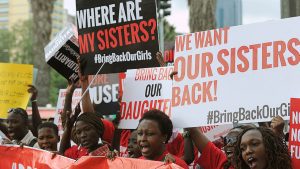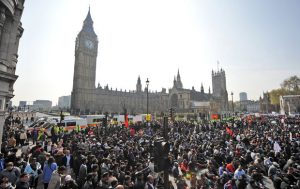By Dr Foluke Adebisi, Teaching Associate (University of Bristol Law School).*

On 14 April 2017, it will be three years since we heard the news that 230 schoolgirls had been kidnapped by Boko Haram, causing global shock and horror. Since then, some have been released, and some escaped. However, focus on the Chibok schoolgirls, often overshadows the greater tragedy.
Amnesty International suggests that over 2,000 girls and women have been abducted by Boko Haram across the North of Nigeria. Though, Borno state, (with a landmass slightly larger than Croatia) and its people have borne the brunt of Boko Haram. Boko Haram is the sobriquet for a group whose activities are predicted on a violent abhorrence for ‘Western’ education. The Arabic names they call themselves translate into ‘Group of the People of Sunnah for Preaching and Jihad’ and ‘Islamic State West Africa Province.’ Their vicious campaigns have kept an estimated 120,000 students from education of any kind. Andrew Walker’s book ‘Eat the Heart of the Infidel’ examines how Boko Haram trades on the currency of religion and the politicisation of education to sell violence to its adherents.
Obviously, if any case is to be made against them as regards the abductees, a cause of action would properly lie within national criminal laws or for crimes against humanity. However, due to the ESC nature of the right to education, the 120,000 students who have been excluded from school seem to have very little recourse to contest the violation of their right to education. This is because ESC rights are largely seen as non-justiciable. Also, the demarcation of rights into ESC and civil/political rights does not reflect the historicity and needs of the populace. An interesting approach to this incongruous distinction is taken by the Inter-American Court of Human Rights (IACrtHR). What lessons, I ask, can we learn from the court? (more…)

